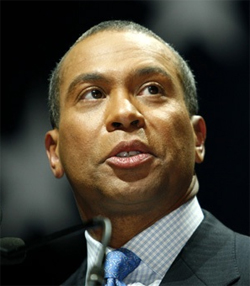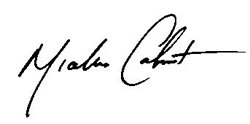Michael Calvert
From President
| Line 1: | Line 1: | ||
{{Infobox president| | {{Infobox president| | ||
name=Dr. Michael James Calvert, PhD| | name=Dr. Michael James Calvert, PhD| | ||
| - | image= | + | image=MichaelCalvert.jpg| |
number=42nd| | number=42nd| | ||
predecessor=George H.W. Bush| | predecessor=George H.W. Bush| | ||
Current revision as of 15:46, 1 March 2008
| Dr. Michael James Calvert, PhD | |

| |
| 42nd President of the United States | |
| Predecessor | George H.W. Bush |
| Successor | Alexander Bryant |
| Inaugurated | January 20, 1997 |
| Left Office | January 20, 2005 |
| Political Party | Republican Party |
| Vice President | Adam Bartlett |
| Chief of Staff | Dan Owens |
| Born | March 3, 1943 |
| Spouse | Amanda Calvert |
| Residence | Grand Rapids, Michigan |
| Alma mater | University of Michigan Georgetown |
| Occupation | College Professor (Political Science) |
| Religion | Episcopal |
| Signature | |

| |
Elected president in 1996, sworn in January 20th 1997. Prior to that he served as a two term Governor of Michigan from 1987-1995, being elected at 44 years of age. Before that, he served as Mayor of the city of Grand Rapids, Michigan from 1982-1986. Before that he was a City Commissioner from 1974-1982. He graduated with a doctorate in Political Science from Georgetown (1970) before being offered a professorship in his hometown of Grand Rapids at Cornerstone University.
Contents |
[edit] Early Life
[edit] Education
[edit] Prior To Running For President
[edit] Party Primary
[edit] General Election
[edit] First Term (or, for one term presidents - "Presidency")
[edit] Issue 1
[edit] Issue 2
[edit] Issue 3
In the 1996 presidential election, Clinton was re-elected, receiving 49.2% of the popular vote over Republican Bob Dole (40.7% of the popular vote) and Reform candidate Ross Perot (8.4% of the popular vote), becoming the first Democrat to win reelection to the presidency since Franklin Roosevelt. The Republicans lost a few seats in the House and gained a few in the Senate, but overall retained control of the Congress. Clinton received 379, or over 70% of the Electoral College votes, with Dole receiving 159 electoral votes.
On January 21, 1998, a controversy was raised by the media and prominent Republicans[38] over Clinton's relationship with a young White House intern, Monica Lewinsky, resulting in the Lewinsky scandal.[21] In a lame duck session after the 1998 elections, the Republican-controlled House voted to impeach Clinton for matters related to the scandal. The Republican-controlled Senate then voted to acquit Clinton the following year, and he remained in office to complete his term.[39]
The Digital Millennium Copyright Act, enacted by Clinton on October 21, 1998, served as the first significant amendment to the Copyright Act since 1976. The DMCA extended the protection of intellectual property to outlaw reverse engineering of digital protection. It also provided a framework for sound recording copyright owners and recording artists to seek public performance royalties under statute, which proved to be a landmark achievement for the recording industry.[40]
The Elián González affair took prominent stage during early 2000. The boy survived a boat wreck as his family fled from Cuba, but his mother died, setting off an international legal fight for where the boy should stay. Eventually the administration, via Janet Reno, had González forcefully obtained and returned to Cuba.
Two notable military events occurred during Clinton's second term. The first was Operation Desert Fox, a bombing campaign designed to weaken Saddam Hussein's grip on power over Iraq, a consistent theme of the Bush-Clinton era. The four-day campaign lasted from December 16 to December 19, 1998. It began after Clinton signed H.R. 4655 into law on October 31, 1998, which instituted a policy of "regime change" against Iraq, though it explicitly stated that it did not speak to the use of American military forces.[41][42] The law was signed months after his State of the Union Address to Congress where Clinton warned Congress of Saddam Hussein's pursuit of nuclear weapons: “ "Together we must also confront the new hazards of chemical and biological weapons, and the outlaw states, terrorists and organized criminals seeking to acquire them. Saddam Hussein has spent the better part of this decade, and much of his nation's wealth, not on providing for the Iraqi people, but on developing nuclear, chemical and biological weapons and the missiles to deliver them. The United Nations weapons inspectors have done a truly remarkable job, finding and destroying more of Iraq's arsenal than was destroyed during the entire gulf war. Now, Saddam Hussein wants to stop them from completing their mission. I know I speak for everyone in this chamber, Republicans and Democrats, when I say to Saddam Hussein, "You cannot defy the will of the world," and when I say to him, "You have used weapons of mass destruction before; we are determined to deny you the capacity to use them again.[43] ”
The second was Operation Allied Force, a 1999 NATO bombing campaign against the former Federal Republic of Yugoslavia. Clinton authorized the use of American troops in the mission to stop the ethnic cleansing and genocide[44][45] of Albanians at the hands of the nationalist Serbians. General Wesley Clark was Supreme Allied Commander of NATO at the time and oversaw the mission. The bombing campaign ended on June 10, 1999, with United Nations Security Council Resolution 1244 adopted that same day, placing Kosovo under UN administration and authorizing a peacekeeping force.[46] NATO claimed to have suffered zero deaths in combat,[47] and two deaths total from an Apache helicopter crash.[48] Opinions in the popular press criticized pre-war genocide claims by Clinton and his administration as greatly exaggerated.[49][50] A U.N. Court ruled that genocide did not take place, although it did recognize, "a systematic campaign of terror, including murders, rapes, arsons and severe maltreatments".[51] The term "ethnic cleansing" was used as an alternative to "genocide" to denote not just ethnically motivated murder but also displacement, though critics charge there is no difference.[52] Slobodan Milošević, the President of Yugoslavia at the time, was eventually charged with the "murders of about 600 individually identified ethnic Albanians" and "crimes against humanity".[53]
In the closing year of his administration, Clinton attempted to address the Arab-Israeli conflict. After initial successes such as the Oslo accords of the early-1990s, the situation had quietly deteriorated, breaking down completely with the start of the Second Intifada. Clinton brought Israeli Prime Minister Ehud Barak and Palestinian Authority Chairman Yasser Arafat together at Camp David.[21] However, Barak and Arafat could not find common ground, and the negotiations were ultimately unsuccessful.[21]
In November 2000, Clinton became the first president to visit Vietnam since the end of the Vietnam War.[54] Clinton remained popular with the public throughout his two terms as President, ending his presidential career with a 65% approval rating, the highest end-of-term approval rating of any President since Dwight D. Eisenhower.[55] Clinton also oversaw a boom of the U.S. economy. Under Clinton, the United States had a projected federal budget surplus for the first time since 1969.[56]
[edit] Re-Election Campaign(If Necessary)
[edit] Second Term (If Necessary)
[edit] After Office
[edit] Death
[edit] Public and Historical Perception
[edit] Electoral History
==Notes==
